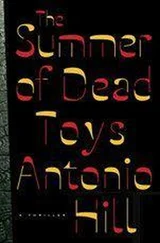Antonio Hill - The Good Suicides
Здесь есть возможность читать онлайн «Antonio Hill - The Good Suicides» весь текст электронной книги совершенно бесплатно (целиком полную версию без сокращений). В некоторых случаях можно слушать аудио, скачать через торрент в формате fb2 и присутствует краткое содержание. Жанр: Триллер, на английском языке. Описание произведения, (предисловие) а так же отзывы посетителей доступны на портале библиотеки ЛибКат.
- Название:The Good Suicides
- Автор:
- Жанр:
- Год:неизвестен
- ISBN:нет данных
- Рейтинг книги:5 / 5. Голосов: 1
-
Избранное:Добавить в избранное
- Отзывы:
-
Ваша оценка:
- 100
- 1
- 2
- 3
- 4
- 5
The Good Suicides: краткое содержание, описание и аннотация
Предлагаем к чтению аннотацию, описание, краткое содержание или предисловие (зависит от того, что написал сам автор книги «The Good Suicides»). Если вы не нашли необходимую информацию о книге — напишите в комментариях, мы постараемся отыскать её.
The Good Suicides — читать онлайн бесплатно полную книгу (весь текст) целиком
Ниже представлен текст книги, разбитый по страницам. Система сохранения места последней прочитанной страницы, позволяет с удобством читать онлайн бесплатно книгу «The Good Suicides», без необходимости каждый раз заново искать на чём Вы остановились. Поставьте закладку, и сможете в любой момент перейти на страницу, на которой закончили чтение.
Интервал:
Закладка:
He took a deep breath.
“There were other sorts of cases. Single mothers who sought refuge in religious institutions where the same method, or worse, was followed. They simply informed them they didn’t deserve to be mothers, that their babies would be better off in the arms of a family as God orders. If they objected they were threatened: sometimes with taking the other children they already had … In any case, the babies were handed over practically at birth and the adoptive parents registered them as their own. What is clear is that money was involved.”
“Yes,” said Leire. “From what I know, in the form of donations, wasn’t it?”
“In the case of religious institutions, of course. And that’s what I’m getting at.”
Andrés Moreno opened the backpack and took out a red file, so old it looked as if it were about to fall to pieces.
“This was one of the refuges for single mothers at that time.”
He showed her a black-and-white photo. Some young nuns posing in front of a house and large gardens. Everyone was smiling for the camera.
“It was the Hogar de la Concepción in Tarragona and it was run by a nun whose name has come to light in more than one file. Sr Amparo. This one.”
There was little to mark her out from the others: the uniforms served their purpose and gave them all the same appearance, docile gray doves.
“I say ‘was’ because it no longer exists. Neither does Sr Amparo, at least in this world. She died four years ago. The Hogar closed at the end of the eighties and its archives must have gone to another institution, or were destroyed. It seems there were few nuns left, but one of them managed to take away some documents with her.”
“What for?”
“Well, let’s say she’d seen certain things there and wanted to keep proof.” Moreno lowered his head and added, “I can’t tell you anything else about her. That was the condition she placed on giving me the information. This information.”
He took out further papers from the file: no doubt they were photocopies of other older ones, which weren’t very legible. Leire took them and studied them carefully.
“They are donations. You can see that the quantities varied, but all of them are very high. We’re talking about millions in the seventies, when six hundred was a lot for normal people. Look at this one in particular.”
According to what was written there, on October 13, 1971, one Ernesto Valldaura Recasens had donated ten million pesetas to the Hogar de la Concepción.
“What are you telling me?” she asked, although her furrowed brow indicated that she’d already guessed.
“It’s obviously not proof of anything. Anyone can donate money to whomever they please. But I started investigating-not him, but all the names that appear here. Although there aren’t many, they were difficult to track down. I was lucky with Ernesto Valldaura. This is his daughter’s birth certificate.” He showed it to her. “Ruth Valldaura Martorell, born October 13, 1971.”
Leire looked at both papers with something akin to vertigo.
“This means …?”
He shrugged.
“It’s not proof of anything. At least not legal proof. As I said, Señor Valldaura had all the right in the world to make donations as generous as he wished and to the center he pleased. But it’s a meaningful coincidence, don’t you think?”
“What else did the nun tell you? The one who gave you all this …”
“Not much. That there were mothers who came back to the Hogar demanding their children, there were many ‘difficult’ labors, and that Sr Amparo ruled the place with an iron fist and coffers always full.”
“When … when did you receive these documents?”
“At the end of last year.”
Ruth had already disappeared by then, thought Leire.
“When I finally tracked down the Valldauras and the birth certificate, I did a quick search for their daughter’s name. And I found out what had happened to her, some months later.”
“Did you go to see them?”
“The Valldauras didn’t want to see me. I suppose they thought I was one more journalist interested in their daughter’s case, and in fact I didn’t insist too much. What were they going to tell me? Talking to them about the donation and the suspicions this could arouse seemed out of place when they had to face the disappearance of that daughter. So I focused on investigating Ruth Valldaura, although to tell the truth I haven’t achieved much. My only lead over the last few days has been you,” he said, smiling. “I admit that I’ve been following you to see if you were also interested in her.”
“But-”
“I no longer have any resources, or time. I thought I might discover something … I even considered the possibility that Ruth’s birth and end might be linked somehow, however improbable it seems. I also thought about approaching Ruth Valldaura’s ex-husband, but hearing about his ‘violent tendencies’ I backed off.”
She smiled. Poor Héctor, some sentences pursue the accused for life. They are the worst-a trail of rumors that refuse to fade and against which the accused can’t fight.
“I’m not from Barcelona,” Andrés Moreno continued, “and now I can’t stay here any longer. The rent has to be paid and I have nothing to publish. Also …”
“Yes?”
“To be honest with you, I don’t know if I want to keep going with this. It’s a dirty business, marked by a cruelty that I sometimes find unbearable. I’m getting married in the spring, I want to start a family …”
Andrés Moreno blushed. The sentence hung in the air, but Leire understood what he meant perfectly.
“A favor,” she said.
“You want the documents? I’ve brought you copies. Use them as you see fit, but-be careful. It’s a matter that will reach the courts someday, although at the moment it’s buried under tons of bureaucracy. And there are many people who want it to remain so. Lots of those implicated have died or retired, lots of the babies are now adults who don’t know the truth. There are many others, of course, seeking justice, embarking on a struggle against oblivion, but I fear that time will dishearten them, keep them quiet, make them disappear …”
Like Ruth, thought Leire. Her outrage and indignation had overtaken all feeling of nausea or fatigue. Like Ruth.
Montserrat Martorell opened the door of her house to her that same day, a little before two. Leire had gone to see her on impulse, and on this occasion the somber expression of Ruth’s mother made little impression on her.
“Here again, Señorita Castro?”
She wasn’t in the mood to beat around the bush, so she put the photocopied document under her nose, barely giving her time to see it. “I think we need to talk.”
Señora Martorell directed her to the same little sitting room she’d received her in the last time, but she didn’t bother to pretend she was welcome. She must have seen she was tired, or upset, because she invited her to sit and Leire accepted.
“Explain this to me,” said Leire. “Please,” she added.
Ruth’s mother put on some small glasses that hung around her neck on a delicate chain and glanced at the paper. Then she took off her glasses and focused her attention on her unexpected visitor. Leire stared once again into Señora Martorell’s gray eyes, intense despite her age.
“I don’t know what you want me to explain. My husband made a donation to this place almost forty years ago. He had a stronger faith then. Time, and life, cure that.”
Leire observed her, unable to decide if this woman was aware of what this document could mean. She decided to get to the point.
“Did you adopt Ruth?”
Señora Martorell folded the sheet of paper and spoke slowly in a voice trying to be cold but not quite managing it.
Читать дальшеИнтервал:
Закладка:
Похожие книги на «The Good Suicides»
Представляем Вашему вниманию похожие книги на «The Good Suicides» списком для выбора. Мы отобрали схожую по названию и смыслу литературу в надежде предоставить читателям больше вариантов отыскать новые, интересные, ещё непрочитанные произведения.
Обсуждение, отзывы о книге «The Good Suicides» и просто собственные мнения читателей. Оставьте ваши комментарии, напишите, что Вы думаете о произведении, его смысле или главных героях. Укажите что конкретно понравилось, а что нет, и почему Вы так считаете.












